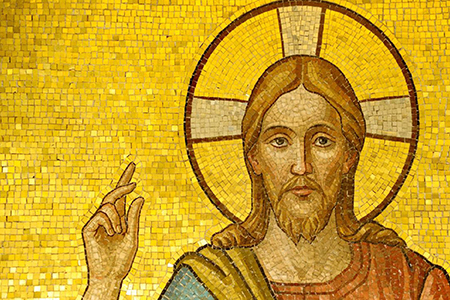The Solemnity of Christ the King marks the end of a liturgical year and springboards to a new one beginning with Advent. After a full year of reflecting on who Jesus is, imploring the Holy Spirit to transform our hearts and minds when we fail, and renewing our relationship with Christ, we have arrived at one of the most important landmarks of our faith and spiritual life, that is, the irrefutable truth and recognition that the son of David, the man whom we crucified is, indeed, the only Son of God, King of kings, Lord of lords; “through Him all things were made” (Rev 17:14). This week’s readings solidify the foundation of our faith and renew our confidence in Jesus Christ our King. Like the criminal who humbly asks, “Jesus, remember me when you come into your kingdom”, we also pray with confidence that we may be worthy to be with Christ in Paradise (Lk 23:42-43).
What does Jesus’ kingship look like? In the first reading, David, king of the Israelites, “made a covenant” with the people “in the presence of the Lord” that He would shepherd God’s people Israel (2Sam 5:3). Indeed, he made a solemn promise to, not only exercise authority, but more importantly, protect and care for the flock on behalf of God. David is not merely called to be a secular ruler like all other rulers; one who exerts authority and might over others, but more poignantly, he is committed to shepherd his people - his flock - with care, compassion, and love. David, of course, prefigures the benevolent Kingship that can only belong to Jesus Christ, the only Son of God and true King of the Universe.
Who is this “King of the Universe”? In St. Paul’s “Christ Hymn”, Jesus is the “beloved Son”; “the image of the invisible God”; “the beginning”; “the firstborn of all creation” and “from the dead”; “all things were created through him and for him”; “head of the body, the church”; and “through him to reconcile all things for him” (Col 1:15-20). Of course, this glorious description of Jesus’ kingship sharply contrasts with Luke’s portrayal of Jesus the wretched criminal, condemned to die on the cross. In this final scene of Jesus’ earthly life, He is condemned by the authorities, “sneered” and “jeered” at by passer-bys and soldiers, mocked, and even “reviled” by His fellow criminals (Lk 23:35-39). In fact, Jesus has been repeatedly asked to “save” himself at the proof that “he is the chosen one, the Messiah of God” (Lk 23:35). Jesus; however, remains silent in this madness. Contrary to the secular value system, Jesus does not need to prove his kingship by “saving” himself, nor flexing his muscles to demonstrate his authority. Indeed, he comes not to be an earthly king but as one to shepherd and gather His flock. Indeed, Jesus’ kingdom “is not from this world” (Jn 18:36). At his trial before the Sanhedrin, when questioned whether He is the Messiah, He replied, “If I tell you, you will not believe” (Lk 22:67). The truth is often a difficult pill to swallow for those who only trust in their own strength and power instead of God’s. Human pride blinds us from recognizing that the real power of Jesus lies not in an earthly sceptre but His unconditional love and compassion.
Jesus’ Kingship has one sole mission: to bring about God’s reign in the hearts of humanity and peace and justice in the world. Jesus exercised his royal office not by flexing his muscles but through service and sacrifice. What does Jesus’ Kingship have to do with us, baptized Catholics and lay members of the Church? The answer is discipleship. Indeed, clergy or laity, we are all called to follow Christ’s footsteps and be instruments of God’s love:
(Fr. David Friel, “Proclaiming Christ’s Kingship”, USCCB.org)
So, let us take courage and be bold as we strive to bring God’s reign in everyone’s heart. “Let us give thanks to the Father, who has made [us] fit to share in the inheritance of the holy ones in light. He delivered us from the power of darkness and transferred us to the kingdom of his beloved Son, in whom we have redemption, the forgiveness of sins” (Col 1:12-14). Let us pray with humility, “Jesus, remember me, when you come into your kingdom” (“Jesus, Remember Me”, Song by Taize).
